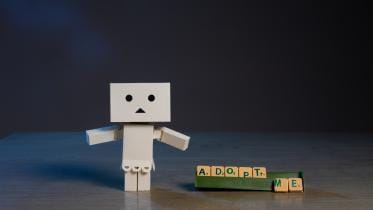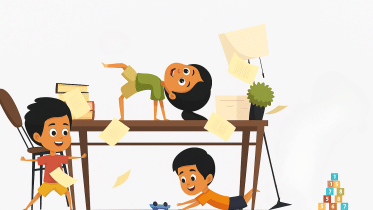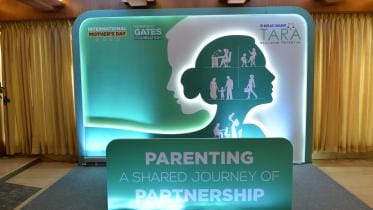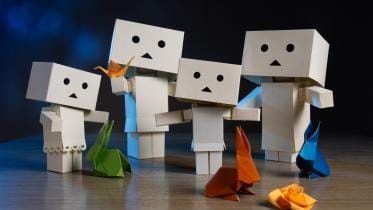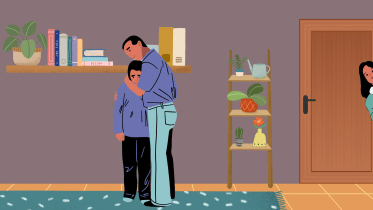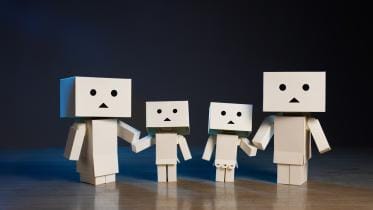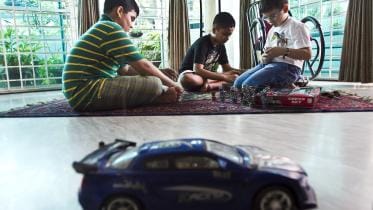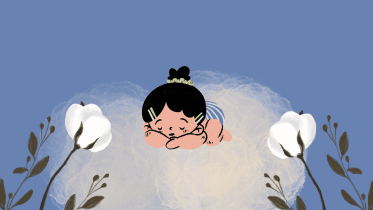Parenting
Are we failing to teach our children to love Bangladesh properly?
Learn how to instil patriotism in your children by teaching them about Bangladesh history, culture, and the importance of service. Raise a generation that believes in Bangladesh's future.
11 December 2025, 10:54 AM
Voting rights should be taught in Bangladesh schools – here’s why
Voting is a powerful right and privilege. After becoming a US citizen in 2017, I voted for the first time in 2018, feeling empowered. I now advocate for teaching children about democracy and voting rights to build informed citizens.
23 September 2025, 07:26 AM
Is Bangladesh ready to fully embrace adoption as parenthood?
In Bangladesh, adoption is slowly shedding stigma, with families like Riad and Muntasir's redefining parenthood beyond biology. Despite progress, adoption remains a hesitant choice, often considered after IVF or other options, reflecting societal and emotional complexities.
22 September 2025, 09:07 AM
Hyperactive kids? 6 easy ways suggested by experienced parents
Managing over-energetic children becomes easier with daily routines, calming activities, reward systems, and fun grounding techniques. Break tasks into smaller parts and prepare them for transitions to encourage focus, reduce tantrums, and support emotional regulation.
21 August 2025, 12:30 PM
How to help kids resist real-life and online peer pressure
Children face intense peer pressure both offline and online, often risking self-worth to fit in. Parents can help by listening, fostering open communication, teaching resilience, instilling family values, and building confidence, ensuring children navigate challenges with strength and self-assurance.
16 August 2025, 11:12 AM
The unseen challenges of single fathers in Bangladesh
A single father's heartfelt journey redefines parenting roles through travel, resilience, and love. Facing judgment, obstacles, and growth, he discovers that being a devoted parent matters more than fitting traditional family norms or gender roles.
14 June 2025, 08:51 AM
BRAC Bank TARA reframes the conversation on parenting: A shared journey of partnership
On the occasion of International Mother’s Day, BRAC Bank’s women-centred initiative TARA held an event that did not just celebrate motherhood or struggles of being a mother but gently pulled apart the structure surrounding it. The event titled “Parenting: A Shared Journey of Partnership” created space for a much-needed dialogue that was not about glorifying sacrifice but rather about asking why parenting still leans heavily, and often unfairly, on mothers and how partners can show up to share it.
19 May 2025, 10:05 AM
The fatherhood we owe our children
A photo exhibition questions outdated views on fatherhood and true commitment.
6 March 2025, 07:00 AM
Raising emotionally intelligent kids: Because feelings matter more than grades
Teaching emotional intelligence in children fosters empathy, resilience, and responsibility. Encouraging emotional expression, assigning small tasks, celebrating efforts, and leading by example nurture EQ, shaping future success. Early development ensures better relationships, perseverance, and long-term emotional well-being.
19 February 2025, 09:33 AM
How parenting changed, and why 'respect' looks different
In the last decades, children were inevitably taught to respect authority figures such as parents, teachers, and law enforcement. Terms such as saying "please" and "thank you" and addressing adults formally were introduced early, with no questions asked.
7 November 2024, 10:44 AM
Empty nest? More like an empty heart: How one family turned loneliness into love
A woman facing an empty nest found renewed purpose by taking in her house-help's daughter. Despite restrictive adoption laws in Bangladesh, her family secured guardianship, focusing on emotional support and building a fulfilling bond.
28 October 2024, 10:40 AM
Is CocoMelon bad for your children?
Cute characters, lively hues, and catchy music — all combine to create CoComelon. Both parents and toddlers find it difficult to resist. However, a growing number of parents are sharing personal accounts lately which raises the question: Is CoComelon causing more harm than good?
24 October 2024, 10:57 AM
Why doing everything for your kids is a recipe for disaster
Children are a reflection of their parents. Those miniature human beings are like sponges; what you teach them, they will absorb. It is best to shape them into more responsible beings from a young age.
11 September 2024, 10:30 AM
Students vs society: Why our kids need more than just grades
I’m not here to take sides, but I want to ask: Why are we so quick to question the students when reports started coming in of some crossing the line?
22 August 2024, 09:47 AM
Parenting 101: How to say ‘no’ without becoming the villain
Parent-child bonding is the most priceless relationship in the world. No one wants to jinx it in life for anything in the world! Yet, there are times when parents are compelled to set boundaries over children’s impulsive actions.
18 August 2024, 09:32 AM
A new school for your child? What parents need to know
Transitions are hard at any stage of life, but for a school-going child, it can be particularly difficult. Children resist change just like adults and feel stressed about unfamiliar surroundings, the challenges of making new friends and missing the comfort of old ones.
4 July 2024, 10:20 AM
How to conquer mum guilt: A guide to self-compassion and balance
“Mum guilt” usually stems from the belief that they are not doing enough for their children. It can be emotionally exhausting, impacting not only their mental health but also their overall well-being. Fortunately, with the right strategies, it is possible to help mothers eventually overcome this guilt and embrace a more balanced and fulfilling life.
30 June 2024, 07:29 AM
Tech parenting: The fine line between convenience and neglect
Technology transforms parenting with sterilised bottles and nanny cams, offering reassurance and convenience. However, overreliance risks eroding vital parent-child bonding. Educating parents on children's developmental needs helps prioritise genuine interactions over excessive screen time.
24 February 2024, 18:00 PM
How clothing can hurt our children
As parents or guardians of new-borns to 14-year-olds, it is our partial responsibility to ensure their safety and well-being. One aspect that often goes unnoticed is the clothes we choose to buy for them. While outside or local clothing options may seem convenient, they can pose certain dangers which are hardly taken seriously.
1 January 2024, 11:13 AM
Parenthood tips: The psychology of sharing a bed with your children
Bedsharing has got to be one of the most debated topics in modern parenthood. While safety experts continuously warn against it, more and more child development research suggest that the practice is beneficial for children, both biologically and psychologically.
9 July 2023, 07:57 AM





